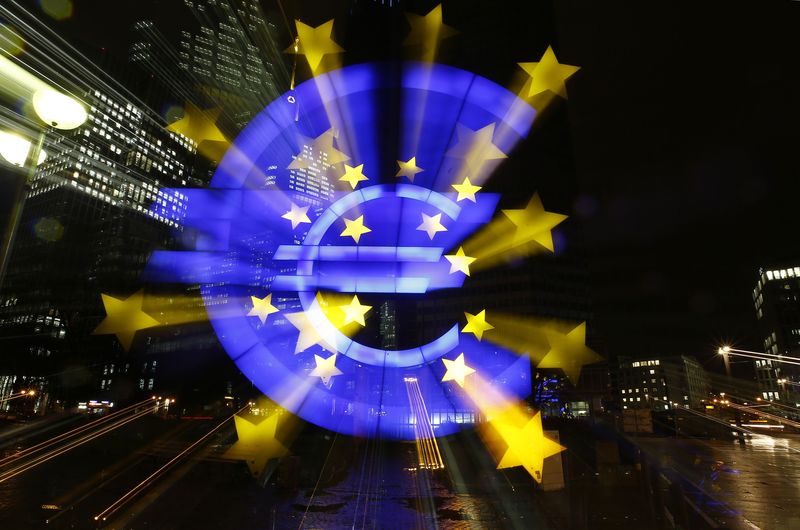By Mike Peacock
LONDON (Reuters) - After a head-spinning bout of volatility, next week will be dominated by one question: Will the European Central Bank take the ultimate policy leap or pull its punches?
The ECB could launch a government bond-buying program with new money as soon as its Jan. 22 meeting, although Greek elections three days later are a complication.
With markets in an unusually febrile state - oil and copper have plunged while the Swiss franc rocketed after Switzerland abandoned its currency cap - it's a fair bet that if the ECB holds back, there will be an extreme reaction.
The euro zone's central bank would have no problem justifying action. It is mandated to deliver price stability and inflation close to 2 percent whereas this has just turned negative and is likely to fall further given the precipitous oil price drop.
The ECB won crucial backing last week for its pledge to do whatever it takes to support the euro when a top European Union court official said there was no legal impediment to buying government bonds to bolster a listless euro zone economy.
But politics and German concerns about risk-sharing will trump the law.
Sources have told Reuters the ECB may adopt a hybrid approach - buying debt and sharing some of the risk across the euro zone while national central banks make separate purchases of their own. The program may also be limited in size to 500 billion euros ($578 billion).
But it is possible that the European court judgment will embolden the ECB. Executive Board member Benoit Coeure said on Friday that QE had to be big to have an impact.
"We expect the ECB to announce government bond buying of between 500 billion and 700 billion euros over 18 months that includes all investment grade government bonds," said Gilles Moec, head of developed Europe economics at Bank of America Merrill Lynch.
GLOBAL DECELERATION
All is not well with the world economy. Last week, the World Bank lowered its global growth forecast for this year and next because of poor economic prospects in the euro zone, Japan and major emerging economies.
A plunge in the price of copper is a poor harbinger, suggesting potential problems in its largest consumer China.
The International Monetary Fund will produce its latest economy forecasts on Tuesday. IMF chief Christine Lagarde sounded downbeat last week, saying cheap oil and solid U.S. growth were not a cure for "deep-seated weaknesses" elsewhere.
Even in countries enjoying robust growth - the United States and Britain - the timing of a first interest rate rise is being clouded. India, with a healthy economy, has already cut rates in response to evaporating price pressures.
It suggests more volatility to come with divergent central bank policies testing the fabric of markets and the economy.
Lower energy costs may well boost consumption in the United States and Britain but for the euro area, it increases the threat of deflation. Flash purchasing manager surveys for the United States, China and the euro zone on Thursday will illustrate the disparity in their fortunes.
All this should be front and center for more than 1,500 business leaders and 40 heads of state or government who will attend the World Economic Forum in Davos, Switzerland.
The WEF said last week the risk of international conflict was now the biggest threat facing countries and businesses, trumping economic concerns. That already looks questionable.
Risks seem to abound.
Greece's snap election will take place on Sunday, Jan. 25. The radical leftist Syriza party has held a consistent lead in the polls and is intent on ending austerity and seeking debt renegotiation with its European partners, though it insists it wants to stay in the euro zone.
There are good reasons to think Greece can no longer threaten the currency bloc as a whole. But it remains a risk most do not want to take.
Greek borrowing costs have shot up but ultra-low yields in Italy and Spain show the bond market buys that view. Whether it continues to if the ECB falls short remains to be seen.
Moody's cut Russia's credit rating to one notch above junk status on Friday and Standard & Poor's is expected to go a step further soon with Moscow facing a deep recession while inflation is forecast to spiral to 17 percent.
Oil is also a headache for the Bank of Japan which meets this week. It will add to domestic purchasing power but push the central bank further away from meeting its inflation goal.
Sources say the BOJ will cut its inflation forecast for next fiscal year - the deadline for meeting its 2 percent target - to 1.5 percent or lower on Wednesday, keeping it under pressure to expand an already huge stimulus program.

($1 = 0.8645 euros)